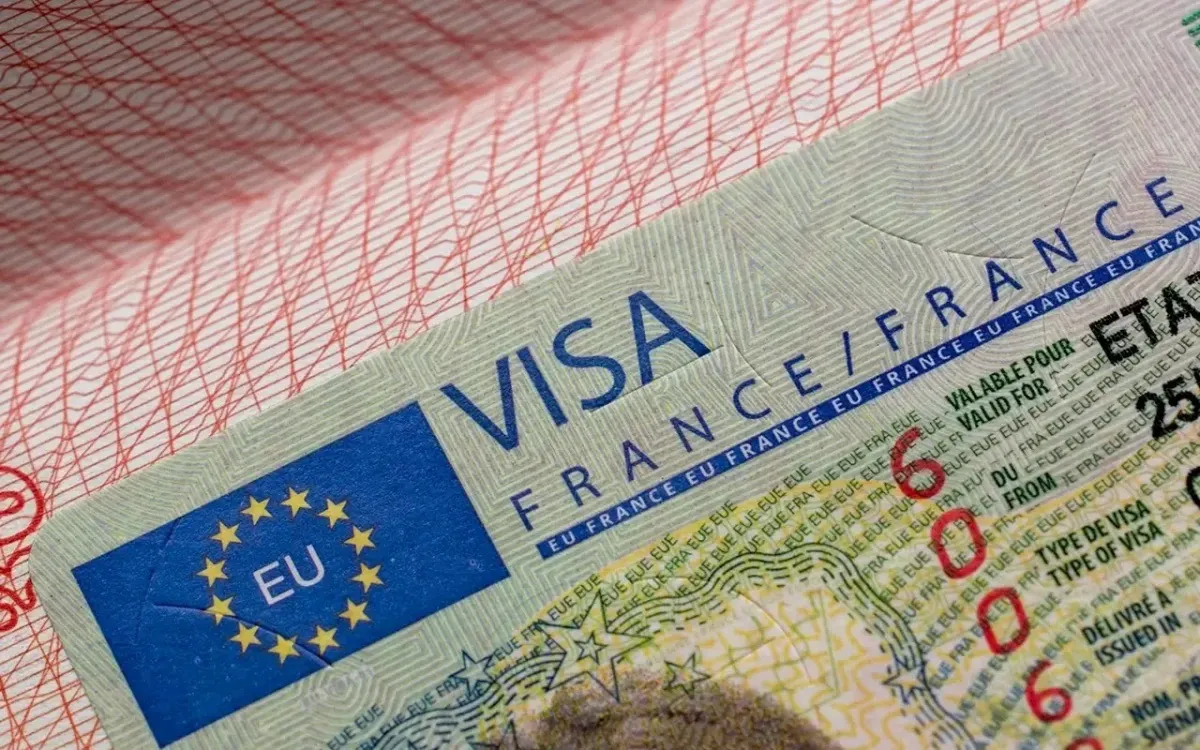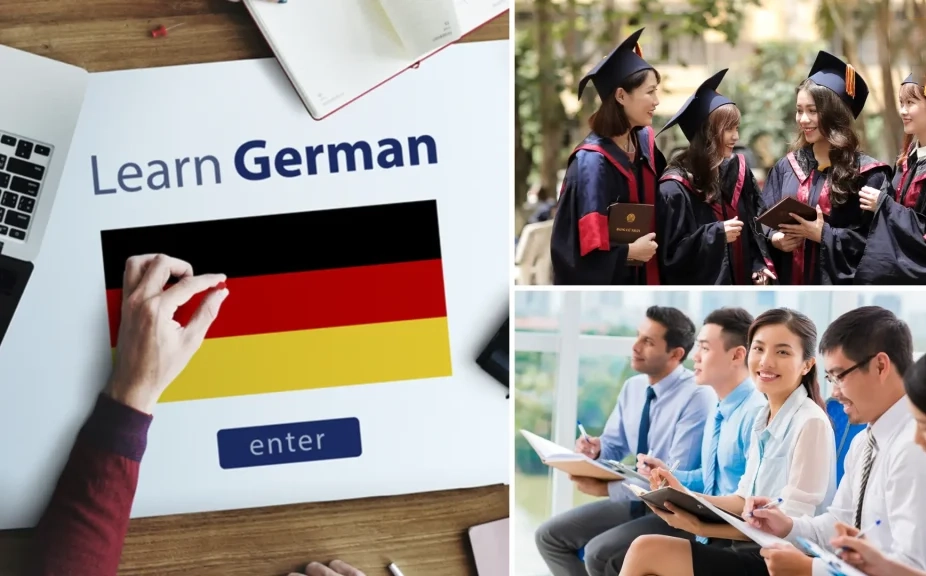The German Visa 18b (under §18b of the Residence Act – AufenthG) is a type of residence permit for skilled workers with a college or university degree who want to come to Germany to work in their field of expertise. This is a fast and effective path that does not require retraining, allowing you to start working immediately with an official contract. The visa is typically valid for up to 4 years, can be extended, and, more importantly, opens the door to applying for a long-term residence permit after 2–3 years of stable employment.
In the context of Germany’s shortage of millions of workers in engineering, IT, healthcare, and logistics, visa 18b is increasingly becoming a strategic choice for Vietnamese people who want to start a career and settle in Europe.

1. How Is Visa 18b Different from Ausbildung and the EU Blue Card?
Visa 18b is often confused with the Ausbildung vocational training program and the EU Blue Card. In reality, these three are completely different.
Ausbildung is a vocational training path that lasts 2–3.5 years. Students learn and work at the same time, receiving a monthly allowance. This is a suitable option for high school graduates or those without a higher education degree.
Visa 18b is for people who already have a recognized college or university degree. Workers can start working immediately under a contract, earning a salary and receiving benefits just like German citizens.
The EU Blue Card is also for people with an academic degree, but it sets a higher minimum salary threshold (2025: €48,300/year; for shortage occupations or recent graduates: €43,760/year). The Blue Card offers an advantage in terms of a shorter time to apply for a permanent residence permit, but visa 18b is more flexible and suitable for those starting their careers in Germany. After gaining experience and a salary increase, you can absolutely switch from a visa 18b to a Blue Card.
2. Suitable Candidates and Detailed Conditions
Visa 18b is for those who have graduated from a college or university and want to work in Germany in their field. The most in-demand fields that are easiest to get a visa for include: engineering (mechanical, electrical, civil, automation), information technology, nursing and healthcare, logistics, business administration, finance and accounting, and hospitality.
The most important condition is that your degree must be recognized as equivalent in Germany. You need to check the Anabin database. If your university or degree does not have an H+ status, you must apply for a certificate from ZAB (Central Office for Foreign Education).
Next, you need an employment contract or job offer from a German company. The contract must specify the position, salary, duration, and insurance and benefits.
The salary for a visa 18b does not have a fixed threshold like the Blue Card, but it must be “reasonable” for the industry and region. For those over 45, the law requires a higher minimum salary or proof of retirement provision.
Regarding language, German is not mandatory for all professions. Many technology and engineering companies accept English, but a B1–B2 German level is a huge advantage for interviews, social integration, and applying for long-term residency.
3. The 7-Month Visa 18b Roadmap
A typical preparation process for a visa 18b takes about seven months.
- Month 1: Start by checking your degree on Anabin or submitting an application to ZAB. Prepare a European-standard CV, a motivational letter, and a portfolio.
- Month 2: Apply for jobs, participate in interviews, and negotiate salary. If successful, you will receive a preliminary job offer.
- Month 3: Sign the official employment contract. This is the most crucial document for the visa application. Also, arrange for a prospective health insurance plan.
- Month 4: Translate and notarize all documents, finalize the visa application, and book an appointment at the Embassy or Consulate.
- Months 5–6: Submit your application, provide biometrics, and wait for processing for 4–8 weeks. You may be asked to provide additional documents.
- Month 7: Receive your visa, book a flight, enter Germany, complete your Anmeldung (residency registration), open a bank account, sign a rental agreement, and start work.
4. Preparation Costs and How to Optimize Them
The cost of a visa 18b ranges from 140–300 million VND, depending on your documents and how you prepare. The main costs include: degree recognition fees (100–600 Euros), translation and notarization (2–10 million VND), visa fee (75 Euros), initial health insurance (50–100 Euros/month), flight ticket (15–25 million VND), and initial living expenses for the first 2–3 months (20–30 million VND/month). If you need to learn German, budget an additional 50–150 million VND.

If you use a consulting service, the cost can increase by 100–250 million VND depending on the package. To save money, you should handle the application yourself and only hire services for truly necessary parts like translation, insurance, or housing assistance. Additionally, negotiating with the company for relocation support, a training budget, or a flight ticket can also help reduce costs.
5. Salary and Benefits in 2025
The average salary for a visa 18b varies greatly depending on the profession.
- IT and Data Engineers: Gross salary from 4,000 to 6,500 Euros/month.
- Mechanical, Electrical, and Civil Engineers: Gross salary from 3,800–5,500 Euros/month.
- Nursing and Healthcare: 2,800–3,800 Euros/month.
- Logistics and Supply Chain: 3,200–4,500 Euros/month.
- Hotel and Restaurant Management: 2,800–3,800 Euros/month.
After deducting taxes and social security contributions (32–35%), you will receive about 65–70% of your gross salary. For example, with a gross salary of 4,500 Euros, your net income will be around 2,950 Euros. After deducting rent, food, and other living expenses, you can save 900–1,200 Euros per month.
In addition to your salary, you will receive comprehensive social benefits: health insurance, pension, unemployment benefits, child allowance (Kindergeld), and a minimum of 20 days of paid leave per year. Many companies also provide relocation packages, free public transport passes, language course support, and performance bonuses.
6. Life in Germany and Residency Opportunities
Upon arrival, you need to quickly complete your Anmeldung (residency registration), open a bank account, and get health insurance. Finding housing in Germany can be difficult due to high deposit requirements (1–3 months), so many people choose to live in a shared flat (WG) to reduce costs.
The work environment in Germany is professional, transparent, and values efficiency. The workplace culture emphasizes punctuality, clarity in emails, and meeting agendas. Colleagues are willing to help when you are proactive.
Regarding residency, visa 18b allows you to apply for a long-term residence permit (Niederlassungserlaubnis) after 2–3 years if you meet the insurance and language requirements. After 5 consecutive years of residency, you can apply for German citizenship, with the new policy allowing for dual citizenship. You can also sponsor your spouse and children to join you. Your spouse will be allowed to work legally.
7. Visa 18b Application Checklist
The required documents include: a passport valid for at least 12 months, a national visa application form, biometric photos, an employment contract, certified translations of your degree and transcripts, an Anabin/ZAB recognition certificate, a CV and motivational letter, proof of work experience, initial health insurance, personal documents (birth certificate, criminal record if required), and the 75 Euro visa fee. Arrange your documents in the exact order specified by the Embassy to ensure a smooth processing.
8. Common Mistakes and Tips for Success
Some common mistakes that lead to application returns or delays include: not checking degree recognition on Anabin beforehand, incorrect or missing notarized translations, a low-salary employment contract, lack of health insurance, submitting the application late, or booking a flight too close to the visa reception date.
To increase your chances of success, you should prepare a clear CV, practice both technical and behavioral interview questions, and ensure your contract clearly states your salary and benefits. Additionally, have multiple photocopies and certified translations ready to submit quickly if requested. Most importantly, apply early and avoid peak times to prevent delays.
9. FAQ – Frequently Asked Questions
- Is German language mandatory for a visa 18b? Not mandatory for all professions, but B1–B2 German is a significant advantage.
- What if my degree is not on Anabin? You need to apply for a ZAB certificate to prove your degree’s equivalence.
- How long does it take to process a visa 18b? About 4–8 weeks after submitting a complete application. The entire preparation process takes about seven months.
- Can people over 45 apply for a visa 18b? Yes, but they need to prove a higher minimum salary or provide financial proof for retirement to ensure social security.
- Can I change jobs while on a visa 18b? Yes, as long as the new job is in your field and is approved by the immigration office.
- Can I sponsor my family to join me? Yes. Your spouse and children can be reunited with you, and your spouse is allowed to work legally.
10. Conclusion
The German visa 18b is an ideal path for Vietnamese people with a college or university degree who want to work in Germany. With a preparation time of about seven months and a cost of 140–300 million VND, you can start working immediately, earn a net salary of 2,300–3,000 euros/month, receive full social benefits, and have the opportunity to get long-term residency.
If you already have a degree, start today: check your degree on Anabin, prepare your CV, find a suitable job offer, and create a clear financial plan. A stable and prosperous future in Germany is waiting for you.
